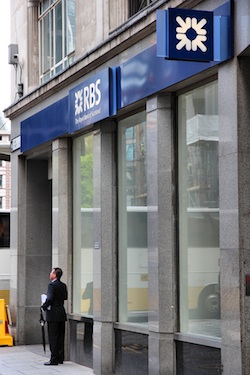LONDON – The head of Royal Bank of Scotland admitted on Tuesday that it had failed to invest in its IT systems “for decades”, after a glitch left customers of the state-rescued lender unable to access cash for three hours.
Chief executive Ross McEwan said it was unacceptable that customers could not use their credit and debt cards for a period of the evening on so-called “Cyber Monday”, one of the busiest shopping days in the run-up to Christmas.
Many of them fumed on Twitter about being left unable to pay for petrol after filling up their cars, while others were forced to abandon trolleys full of shopping at the checkout.
 “Last night’s systems failure was unacceptable. Yesterday was a busy shopping day and far too many of our customers were let down, unable to make purchases and withdraw cash,” McEwan said in a statement.
“Last night’s systems failure was unacceptable. Yesterday was a busy shopping day and far too many of our customers were let down, unable to make purchases and withdraw cash,” McEwan said in a statement.
“For decades, RBS failed to invest properly in its systems.
“We need to put our customers’ needs at the centre of all we do. It will take time, but we are investing heavily in building IT systems our customers can rely on.
“I’m sorry for the inconvenience we caused our customers. We know we have to do better.”
McEwan said he would put forward plans in January “for making RBS the bank that our customers and the UK need it to be”, including outlining which areas that needed future investment.
British taxpayers own 81 percent of the banking group, which includes Natwest and Ulster Bank, after the government saved it from collapse following the 2008 global financial crisis.
Ministers are looking to return RBS to the private sector but it still possesses £38 billion ($61 billion, 45 billion euros) of high-risk assets and has suffered a number of blows to its reputation.
The bank said in a statement earlier Tuesday that the “systems issues” that caused Monday’s outage had been resolved and all services were now working normally.
“If anyone has been left out of pocket as a result of these problems, we will put this right,” it said.
By then many customers had taken to Twitter to publicly vent their frustration, with one tweeting: “Just had to leave an IOU at the petrol station.”
Another complained: “NatWest_Help just topped up a full tank of petrol only to find out there are technical difficulties with all NatWest cards.”
It was the latest in a string of technological meltdowns at RBS, most recently when an IT failure in May left customers unable to access their accounts online using mobile apps.
In June 2012, a software upgrade left hundreds of thousands of people unable to make or receive payments for several days, and cost the group £175 million (211 million euros, $287 million) in compensation.
Aside from the technical problems, RBS has been caught up in an international investigation by regulators into the manipulation on the foreign exchange market.
And last month a report by the British government accused RBS of forcing small businesses to default so that it could seize their assets.














